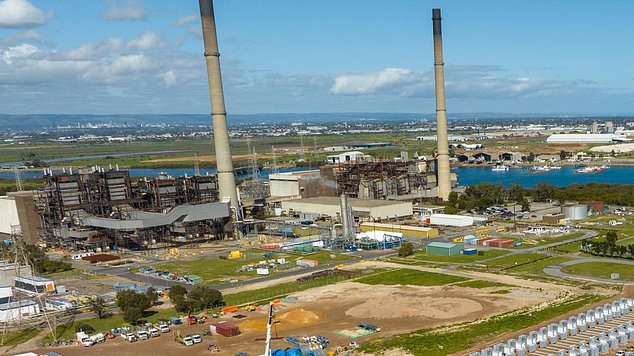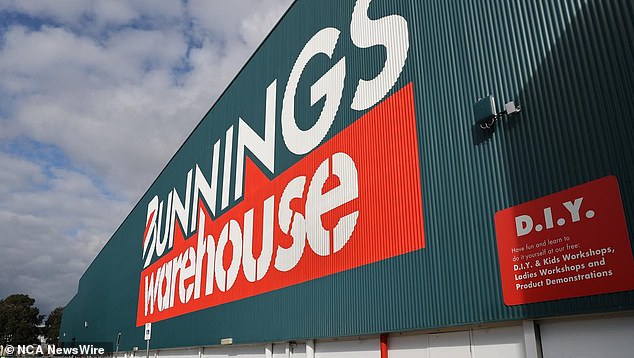A leading union says Bunnings shoppers and workers could be at risk of lead poisoning after some of its members allegedly bought rolls of lead sheeting from the retail giant that may not have been safely packaged.
The alleged exposure is believed to have occurred at the Bunnings store in Woodville, in the Adelaide metropolitan area, with the Electrical Workers Union claiming the lead product was “on a shelf in an aisle at Bunnings with no safety precautions in place”.
Lead is a highly toxic metal and a neurotoxin that poses health risks to the human body.
The Communications, Electrical and Plumbing Union of South Australia told NewsWire it had carried out lead level tests at the store in June, showing a reading of 59,000 micrograms per 100 cm2 on the shelf with visible dust present and 3,300 micrograms per 100 cm2 on the floor.
For the entire store, the test showed a lead level of 6.8 micrograms per 100 cm2.
“We call on Bunnings to ensure it puts the public first and takes all necessary steps to protect the community from lead exposure from lead-containing products sold in its stores,” said CEPU SA Secretary John Adley.
A Bunnings spokesman disputed the union’s claims about safety risks and said it had taken steps to ensure product safety. SafeWork SA said it was satisfied with the handling of the situation.
ETU national secretary Michael Wright warned there was “no cure” for lead poisoning.
A leading union says Bunnings shoppers and workers could be at risk of lead poisoning (file photo)
“We need better protections against the deadly effects of lead in the workplace,” he said.
“It’s an absolute disgrace that this is even an issue.
‘The ETU supports the workers currently affected and calls, in no uncertain terms, for the risk of lead exposure to be eliminated from all workplaces, for all workers and communities.’
A Bunnings spokesperson said: “There is nothing more important to us than the safety of our staff and customers, including the products we sell.”
“The SDA (the retail, fast food and warehouse workers union) recently raised a concern with us about the sale of lead sheeting, used primarily in roofing applications,” he said.
‘In response, we received expert advice confirming that the way the product is sold poses little risk to customers and team members.
‘To put this into context, the risk associated with lead-containing building materials typically comes from their physical modification, such as heating, grinding and soldering in the workplace, rather than handling them in a warehouse.’
SafeWork SA confirmed to NewsWire that it had investigated a “large hardware store” in South Africa in June and said it was satisfied with the actions taken by the store to correct any perceived health risks.
“In June 2024, SafeWork SA became aware that a large South Australian hardware store was supplying products containing lead that were not adequately packaged to protect workers and customers handling the product,” a SafeWork spokesperson said.
‘SafeWork SA inspectors visited the store the day after notification to ensure appropriate control measures were in place in accordance with workplace health and safety laws and product manufacturer guidelines.
‘These products only pose a risk of lead contamination, even for workers and customers, if they are handled without protection. This can be avoided with appropriate packaging and the use of gloves.
‘SafeWork SA conducts audits and compliance checks at businesses across South Australia and will take appropriate action if breaches of the Workplace Health and Safety Act are identified.
‘SafeWork SA is pleased with the steps taken by the store in how it handles and displays lead products and how the company is taking a consistent approach with its other stores across South Australia.’
Bunnings also confirmed it had worked with a supplier to update the packaging and labelling of all current and future stock, with the changes being rolled out nationwide.
The launch is expected to be completed in the coming weeks.
As an interim measure, the company is storing current stock in containers at its goods receipt warehouse, where it is available on request.
The health scare follows alleged lead poisoning among union members working to decommission the AGL Torrens Island plant in late 2022 and early 2023.

Some unionised workers have suffered possible lead poisoning at AGL’s Torrens Island power station in South Australia. Photo: supplied
AGL Torrens Island workers removed more than 30 tonnes of high voltage cable without implementing safety controls.
The workers suffered acute lead toxicity from the job, the union said, causing insomnia, abdominal pain, weight loss, cognitive problems with memory, headaches and chronic fatigue.
An AGL spokesman said the company would support affected workers.
“During the decommissioning work at Torrens A station, sections of redundant electrical wiring were removed,” the spokesman said.
‘When the hazard associated with handling lead was identified, work was suspended, the work area was monitored and the level of exposure was assessed.
‘The affected workers were and continue to receive support from AGL.
‘Our staff were informed of the incident and have participated in regular briefings on the risks and controls when working with substances that may contain lead.
‘In response to the incident, AGL has taken a number of measures, both on Torrens Island and at other AGL sites, to ensure the health and safety of our people.
‘Developed by an independent certified industrial hygienist, AGL has issued new Safe Work Instructions specific to the hazards associated with handling lead wire.
‘AGL reported the incident to SafeWork SA and continues to collaborate and work with SafeWork SA and CEPU.’


